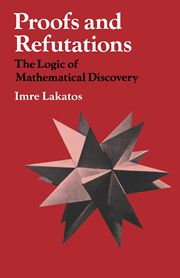APPENDIX 2 - The Deductivist versus the Heuristic Approach
Published online by Cambridge University Press: 05 June 2012
Summary
The Deductivist Approach
Euclidean methodology has developed a certain obligatory style of presentation. I shall refer to this as ‘deductivist style’. This style starts with a painstakingly stated list of axioms, lemmas and/or definitions. The axioms and definitions frequently look artificial and mystifyingly complicated. One is never told how these complications arose. The list of axioms and definitions is followed by the carefully worded theorems. These are loaded with heavy-going conditions; it seems impossible that anyone should ever have guessed them. The theorem is followed by the proof.
The student of mathematics is obliged, according to the Euclidean ritual, to attend this conjuring act without asking questions either about the background or about how this sleight-of-hand is performed. If the student by chance discovers that some of the unseemly definitions are proof-generated, if he simply wonders how these definitions, lemmas and the theorem can possibly precede the proof, the conjuror will ostracize him for this display of mathematical immaturity.
In deductivist style, all propositions are true and all inferences valid. Mathematics is presented as an ever-increasing set of eternal, immutable truths. Counterexamples, refutations, criticism cannot possibly enter. An authoritarian air is secured for the subject by beginning with disguised monster-barring and proof-generated definitions and with the fully-fledged theorem, and by suppressing the primitive conjecture, the refutations, and the criticism of the proof. Deductivist style hides the struggle, hides the adventure.
Information
- Type
- Chapter
- Information
- Proofs and RefutationsThe Logic of Mathematical Discovery, pp. 142 - 154Publisher: Cambridge University PressPrint publication year: 1976
